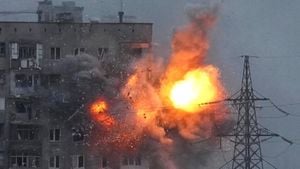Bangladesh has recently seen significant turmoil following the arrest of Hindu priest Chinmoy Krishna Das Brahmachari, associated with the International Society for Krishna Consciousness (ISKCON). Just hours after his detention, reports emerged of cyberattacks targeting ISKCON’s social media platforms, which are integral for promoting Hindu spirituality and community engagement. This troubling sequence of events is indicative of broader concerns surrounding the treatment of minorities, especially Hindus, within the country.
On November 25, 2024, Brahmachari was taken by the Detective Branch (DB) of the Dhaka Metropolitan Police at Hazrat Shahjalal International Airport. The state’s rationale for the arrest linked him to alleged terrorism—a charge fiercely dismissed by ISKCON and other Hindu organizations, who assert their commitment to peace and non-violence. The spokesperson for ISKCON described Brahmachari as the head of Pundarik Dham and remarked on the unsubstantiated nature of the accusations against him. Indian lawmakers and analysts have echoed these sentiments, criticizing the allegations as part of systemic targeting faced by the Hindu community.
Following various protests across Bangladesh, including major demonstrations in Dhaka and Chittagong, at least 20 individuals were reported injured during clashes with police. The response to Brahmachari's arrest has been vehement, with participants chanting slogans demanding justice and the release of the detained priest. Prominent figures such as Taslima Nasreen, known for her strong advocacy for minority rights, were vocal about the injustices faced by the Hindu community. Reports indicate mounting tensions as security forces reacted aggressively against protestors, intensifying fears about the treatment of Hindus.
Charu Chanda Das, Secretary General of ISKCON Bangladesh, expressed grave concerns over both the cyberattacks on their platforms and the arrest of Brahmachari. He highlighted the pivotal role of their social media pages, especially ISKCON TV Dhaka, which were targeted by cybercriminals shortly after Brahmachari's arrest. This attack was claimed by a group identifying itself as “Cyber Defender Bangladesh,” which not only disrupted ISKCON’s outreach efforts but also violates Facebook’s policies on harassment and cybercrime.
Chanda Das reported, “Our ISKCON TV Dhaka page was maliciously attacked and taken down by this group. This platform is integral for promoting Sanatan Dharma, ISKCON’s teachings, and Hindu values. Such acts are deeply distressing.” He noted attempts to restore the page and criticized authorities for their failure to protect the community’s online presence. Amid these challenges, ISKCON volunteers from Garuda Cyber Shield have been working tirelessly to restore the compromised platforms, demonstrating resilience within the community.
Compounding these issues, the Ministry of External Affairs (MEA) of India voiced deep concerns over Brahmachari's arrest, stressing it reflects broader societal violence against Hindus and other minorities. This situation, they observed, follows several documented attacks against Hindus, including vandalism and arson, especially evident following the recent political changes within Bangladesh. The MEA explicitly condemned the fact perpetrators of violence against minorities remain unpunished, with religious leaders facing arrest for advocating for their communities under the guise of sedition.
Indian officials are pressing for the immediate release of Brahmachari and have urged the Bangladeshi government to safeguard the rights of minority communities to assemble and express their beliefs peacefully. Reacting to the heightened tensions, the ISKCON organization called on the Indian government to engage with Bangladeshi authorities to facilitate the release of Brahmachari, indicating the far-reaching effects of these events on Indian-Bangladeshi relations.
During the protests, videos circulated on social media depicted clashes between police and demonstrators, highlighting the volatile atmosphere as tensions boil over. Amid the chaos, local Hindus have rallied together, illustrating their communal spirit and determination to fight what they view as systemic oppression. This resilience is underscored by calls for justice not only for Brahmachari but for all who have suffered under this perceived regime of intimidation.
These tumultuous events have raised international awareness of the challenges faced by religious minorities in Bangladesh, drawing responses from various global organizations focused on human rights. The outcry may serve to galvanize support for the Hindu community facing significant risks to their fundamental rights and freedoms.
Correspondingly, many hope these incidents will lead to greater scrutiny on the actions of the Bangladeshi government and initiatives aimed at ensuring the protection of minority rights. The narrative surrounding Brahmachari’s arrest and subsequent attacks on ISKCON’s platforms highlights the precarious situation for Hindus and the urgent need for dialogue and intervention to promote religious harmony.
While the future of Chinmoy Krishna Das Brahmachari remains uncertain, the mounting pressure from both within Bangladesh and the international community could pave the way for necessary changes. The spirit of resilience exhibited by protestors and the commitment of organizations like ISKCON may yet offer pathways to justice and recognition for the rights of minority communities amid troubling patterns of violence and discrimination.
Hindus and their allies continue to hope authorities will act decisively against those responsible for the targeted harassment of their community. They seek not only the immediate release of Brahmachari but also broader reforms to safeguard their civil rights and freedoms, thereby reflecting the need for societal healing and reconciliation.



